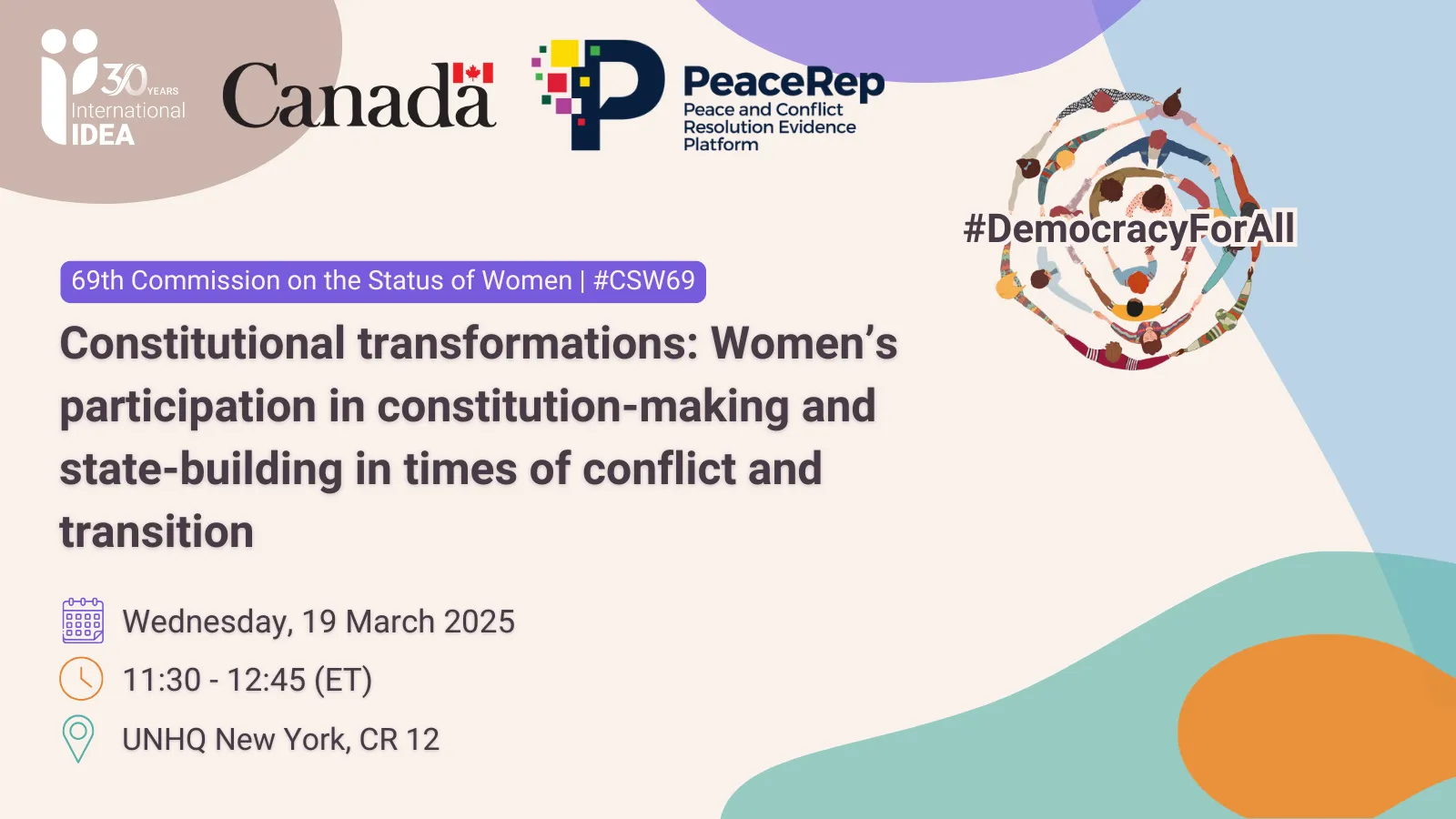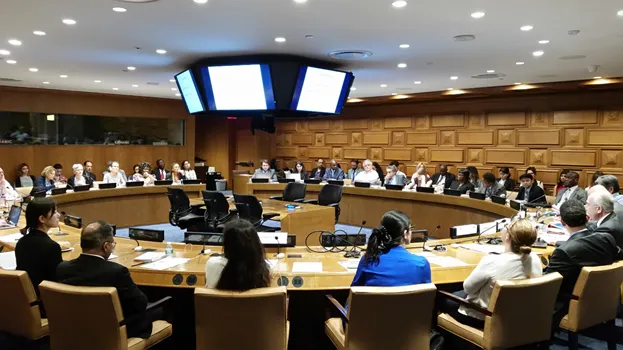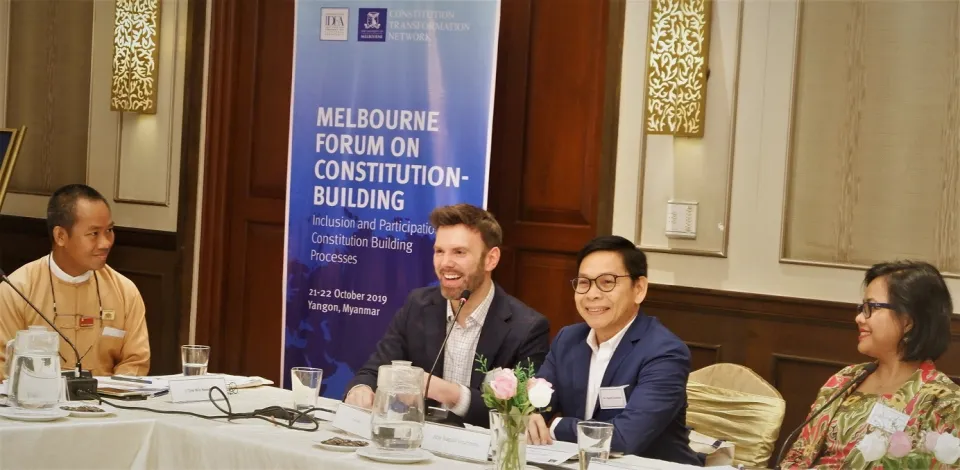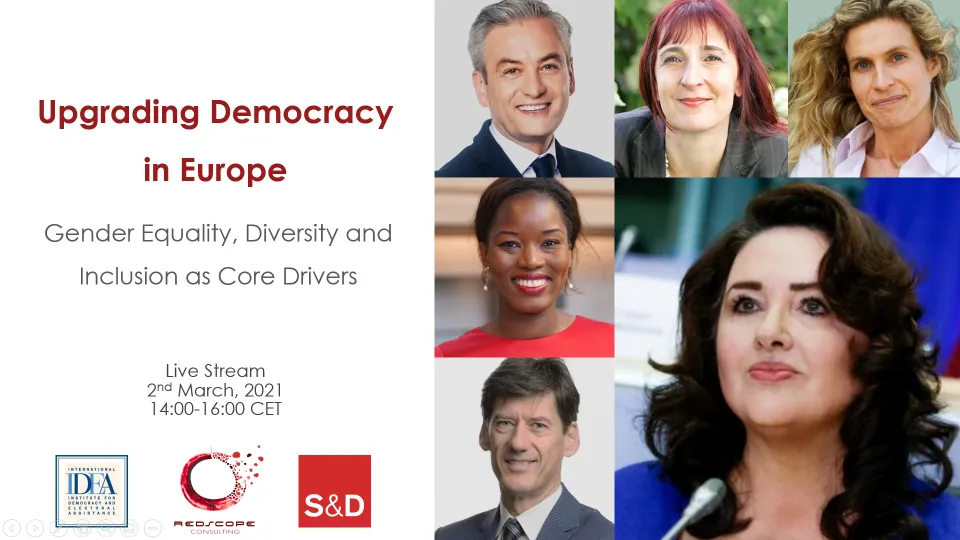Constitutional transformations: Women’s participation in constitution-making and state-building in times of conflict and transition

Women are often marginalised from decision-making in conflict and transitional contexts. Despite evidence that women’s presence and participation lead to better and longer lasting outcomes for peace, they remain underrepresented in transitional governments and peacebuilding bodies. They are also underrepresented in constitutional reform processes that are often part of transitions as countries move from conflict and/or authoritarian rule to peace.
The Beijing Declaration and Platform for Action 1995 was a visionary agenda for women’s empowerment, championing women’s increased access to power and decision-making related to armed conflict. United Nations Security Council Resolution 1325 of 2000 further acknowledged the gendered aspects of peace and security, the crucial role of women in securing and maintaining peace, and called for the increased participation of women in conflict resolution processes at national, regional and international levels.
In the decades since, many gains have been made. Women are included in increasing numbers in constitution-making bodies, with the 2021-2022 Chilean Constitutional Convention setting a global precedent for gender parity. Gender equality, participation and inclusion are internationally accepted norms and are increasingly incorporated explicitly into peacebuilding and constitution-making processes.
Importantly, both the Beijing Declaration and UN Security Resolution 1325 recognize women as active agents rather than passive recipients. The involvement of women is measured not just by numbers, but in the influence that they have in the complex processes that lead countries out of conflict and into peace, including the provisions of constitutions, peace agreements and other instruments of government. In parallel, there is also growing acknowledgement of women’s roles as agents of change—in protests leading to democratic transitions, during conflict and after coups, and in periods of democratic consolidation.
We can see the influence of these changes in post-coup Myanmar, to take just one example. Women make up at least 60 per cent of Myanmar’s pro-democracy movement, serving in combat roles and non-lethal resistance efforts, as fighters, politicians, fundraisers, and activists. While political life in Myanmar has traditionally been male-dominated, women have increasingly assumed roles and responsibilities in the transitional bodies, particularly at regional and state levels. Gender has been taken seriously by democratic leaders: for example, a gender quota was introduced in the Federal Democracy Charter adopted in 2022, requiring at least 30 per cent women at different levels of decision-making in the future institutions of Myanmar’s Federal Democratic Union. Another example is Syria, where advocacy by Syrian women’s groups contributed to nearly 30 per cent representation of women in the Syrian Constitutional Committee envisaged under UN Security Council Resolution 2254 (2015). With the start of a new process, the Syrian Women's Political Movement and other women's groups are advocating through various channels, demanding that there is inclusion of more women in all processes. In Palestine, women have long been involved in efforts for constitutional reform, but it has been difficult for authorities to engage in serious discussions of constitutional change. Amid ongoing war, there is a need to restructure Palestinian institutions and engage women, young people and grassroots movements in shaping Palestine’s future.
However, despite some gains, the lack of physical security and the impacts of poverty, violence and patriarchal cultural values continue to impede women’s participation and the realization of change during these transitional periods.
Building on the CSW69 thematic focus on the progress made and challenges encountered in achieving the goals of the Beijing Declaration, this side event focuses on the critical role of women in peacebuilding and constitution-building during times of conflict and transition. In conversation with influential women leaders who have played key roles in peace building and constitution building in diverse contexts, the event will explore:
- The impact of the Beijing Declaration and Resolution 1325 on women’s participation and influence in peace-building and constitutional change in transitional contexts;
- Effective strategies to enhance women’s participation and contributions in peacebuilding and constitution-making processes during periods of democratic transition or conflict/coups;
- How greater numerical representation of women in formal decision-making bodies can shape the substance of a constitution in ways that promote gender equality.
- The most effective forms of support that the international community and external actors can provide.
Drawing on insights from the annual Women Constitution-Makers’ Dialogue, this event will offer a unique platform to bring together women to share their experiences and insights. Given the changing landscape of conflict in the last decade, it will also provide a forum for stakeholders to better understand and address new challenges in achieving gender equality in peacebuilding and constitution-making.
***
Event Agenda
Welcoming Remarks
Sharon Pia Hickey, Programme Officer, Constitution-Building Programme, International IDEA
Opening Remarks
Ambassador Bob Rae, 80th President of the Economic and Social Council and Permanent Representative of Canada to the United Nations
Panel Discussion
- Myat Thida Thun, Elected MP and Chairperson of the International Relations Committee, Myanmar
- Dr. Sanaa Alsarghali, Member of the Palestinian Drafting Committee; Associate Professor of Constitutional Law at An-Najah National University, Palestine
- Sana Mustafa, Non-Profit Leader and Human Rights Activist, Syria
- Christina Shaheen, Gender and Inclusion, Standby Team of Senior Mediation Advisers, United Nations Mediation Support Unit
Closing Remarks
Annika Silva-Leander, Head of North America and Permanent Observer to the UN, International IDEA



